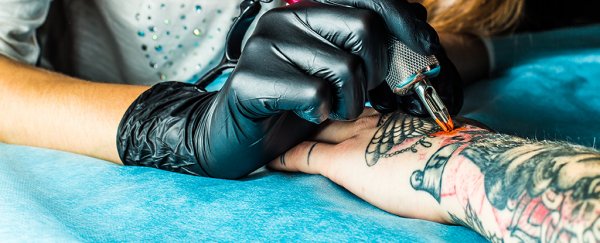More needs to be done to ensure that tattoo inks and other permanent makeup products are bacteria-free, according to the authors of a new study that found worryingly high numbers of commercial samples with bacteria in them.
Testing found bacteria in about 35 percent of the tattoo inks and permanent makeup sampled in the US. That includes both aerobic bacteria that need oxygen to live, and anaerobic bacteria that don't – meaning they could survive in the dermal layer under the surface of the skin, even without an air supply.
The research was carried out by a team from the National Center for Toxicological Research (NCTR) and the Center for Food Safety and Applied Nutrition (CFSAN), both part of the US Food and Drug Administration (FDA).
"Our findings reveal that unopened and sealed tattoo inks can harbor anaerobic bacteria, known to thrive in low-oxygen environments like the dermal layer of the skin, alongside aerobic bacteria," says microbiologist Seong-Jae Kim from the NCTR.
"This suggests that contaminated tattoo inks could be a source of infection from both types of bacteria."
The team tested 75 inks from 14 different manufacturers, sampled from sealed, previously unopened bottles. Researchers made 1-2 grams of each ink up into solutions that were then placed into incubators for observation.
Microorganisms were discovered in 26 of the 75 samples taken, including 8 potentially pathogenic species. The most common species were of the Staphylococcus genus, associated with a variety of different infections.
Of the 75 tattoo and permanent makeup inks sampled, 49 were specifically claimed by the manufacturer to be sterile and free from bacteria. However, this didn't match what the researchers found when they opened the bottles.
"There was no clear link between a product label claiming sterility and the actual absence of bacterial contamination," says Kim.
The results imply that tattoo ink sterilization procedures may not completely eradicate bacteria or that sterility claims made on labels may not be true. The researchers suggest the effectiveness of methods used to sterilize tattoo inks needs to be evaluated.
Around 1 in 3 adults in the US have at least one tattoo, and inking up has already been linked to a number of health issues, including an increased cancer risk. However, research has also shown getting tattoos can actually strengthen your immune system.
Most tattoo-associated complications are reactions from the immune system, but between 0.5 and 6 percent of tattooed people also experience microbial infections. It's only recently that these problems have been linked to the inks themselves, rather than issues with hygiene or aftercare.
This is the first study to look at anaerobic as well as aerobic bacteria in tattoo inks, and highlights the importance of knowing what's actually inside these inks so that tattoos can be safely applied.
"In light of our study results, we want to emphasize the importance of continuously monitoring these products to ensure the microbial safety of tattoo inks," says Kim.
The results have been published in Applied and Environmental Microbiology.
